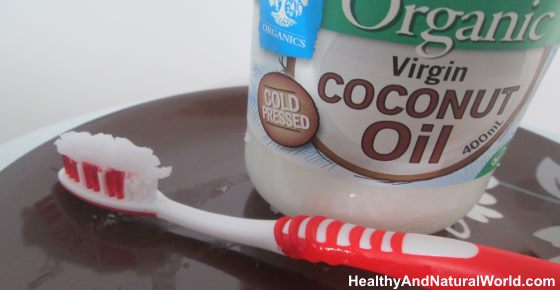Why You Should Start Using Coconut Oil as a Toothpaste

Coconut oil has revealed another of its many health benefits – it can kill bacteria associated with tooth decay. Coconut oil could prove to be a viable and safe alternative to commercially used chemical products and all you need to do it to keep it in your mouth so that it would interact with the enzymes found in your saliva.
Coconut Oil May Be Better Than Commercial Toothpastes According to a Study
Researchers from Ireland’s Athlone Institute of Technology (AIT) tested coconut oil’s action against Streptococcus bacteria, which inhabit your mouth. They showed that when the oil was treated with enzymes, in a process similar to digestion, it inhibited the growth of bacteria, including Streptococcus mutans that produces acids which can make your teeth rot.
The research team tested vegetable oil, olive oil and coconut oil, both in their natural state and when treated with enzymes.
Only coconut oil treated with enzymes showed the antimicrobial activity, and already small quantities were able to reach the positive effect.
Keeping coconut oil in your mouth allows it to interact with your saliva which has natural digestive enzymes from your own body.
This recent research built on a previous study that examined the effects of enzyme-treated milk, which also showed the potential to prevent the harmful bacteria from binding to tooth enamel.
Dr. Damien Brady, the lead researcher, explains that their data shows the products of human digestion have an antimicrobial activity. Furthermore, he believes the findings are important for the future of dental hygiene products.
3 Good Reasons to Replace your Standard Toothpaste for Coconut Oil
If you’re considering ditching your artificial commercial toothpaste, here are some reasons to support your decision to use coconut oil instead:
1. It’s natural and safe
Many commercial toothpastes contain potentially toxic chemicals.
Here are some of the dangerous substances in your commercial toothpaste:
- Triclosan – which might cause hormonal disruptions and antibiotic resistance. It has also been linked to some types of cancers.
- Fluoride– a poisonous industrial waste product. I’ve already covered the hidden dangers of fluoride in your water.
- Surfactants, such as sodium laureth sulphate (SLS) – a foaming agent that can cause canker sores and disturbs the function of your taste buds.
If you use coconut toothpaste, you avoid all these potentially harmful effects.
2. It kills cavity-causing organisms
As demonstrated by the recent study and other research findings, coconut oil acts against Streptococcus mutans and reduces the chances of developing tooth decay, which attacks between 60 and 90 per cent of all children.
3. It’s not expensive
Since only a small amount of the oil is required, a bottle will last you for a long time. Also, this toothpaste can be made at home, which can further increase its health value.
Related: How to Tell If Coconut Oil Is Bad: 4 Signs of Expired Coconut Oil
Coconut oil and Baking Soda
You can use coconut oil by itself as a tooth paste or you can also combine it with baking soda. Baking soda is a great alkalizer and it helps to neutralize acids in the mouth. You may have heard the claim that baking soda is abrasive. However, compared to commercial toothpastes, baking soda is much less abrasive, and therefore healthier for your teeth.
Here is a simple recipe for coconut oil and baking soda toothpaste:
Baking Soda and Coconut Oil Toothpaste
You can make a larger or smaller batch depending on how long you would like it to last and what size container you’re storing it in.
2 tablespoons unrefined virgin coconut oil
2 tablespoons baking soda
Preparation
Mix baking soda and coconut oil in a small container until it has a consistency of a paste. Use it as a normal toothpaste, and brush the teeth in the morning and night.
If you live in a place where the temperature is less than 24°C (75°F) in which the coconut oil is solid, you can either put the coconut oil jar in a bowl with warm water several minutes before brushing your teeth to soften the coconut oil, or you can break a piece of the coconut oil (with a spoon), place it on the toothbrush and then it quickly melts when you brush with it due to the body heat.
Coconut Oil as a Mouth Wash (Oil Pulling)
The technique of oil pulling or oil swishing has been with us for a long time and is a traditional folk remedy that was mentioned in Ayurvedic medicine for oral health.
Take about 2 tablespoons of coconut oil when you wake up in the morning and before you eat anything. Swish the oil around your mouth, teeth, gums and tongue for about 15-20 minutes. During that time the oil will have changed its color to whiter or yellowish color.
Don’t swallow the oil, as your aim is to get rid of toxins and if you swallow any oil, you put the toxins back into your body. After 20 minutes spit all the oil out.
For more information, including studies, read my article on why you should start oil pulling today.
Coconut oil and Crushed Eggshells
I’ve already written about the science behind the eggshells toothpaste and you can find the recipe for a coconut oil and crushed eggshells toothpaste in my article on how to use eggshells to heal your cavities.
Coconut Oil and Gum Massage
Previously, coconut oil showed to be successful in gum massage therapy. A study, published in the Journal of Indian Society of Periodontology, showed that the use of coconut oil over a period of three weeks significantly reduced the amounts of Streptococcus mutans and Lactobacillus in the participants’ mouths, and it also reduced plaque formation.
In addition, the study showed that sesame oil and olive oil were effective in reducing mouth bacteria as well. For more information read my article on how to treat gum infection (gingivitis).
Read my other related articles:
